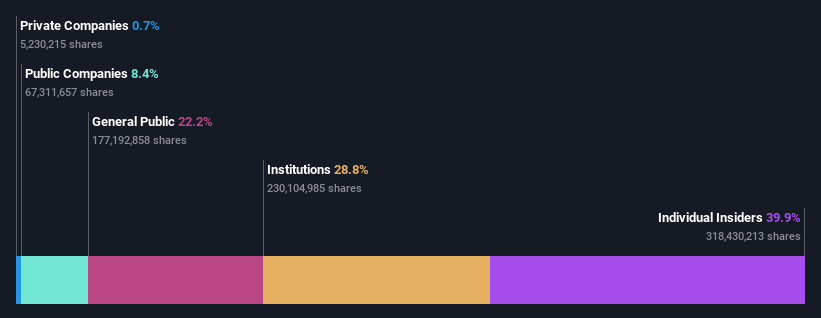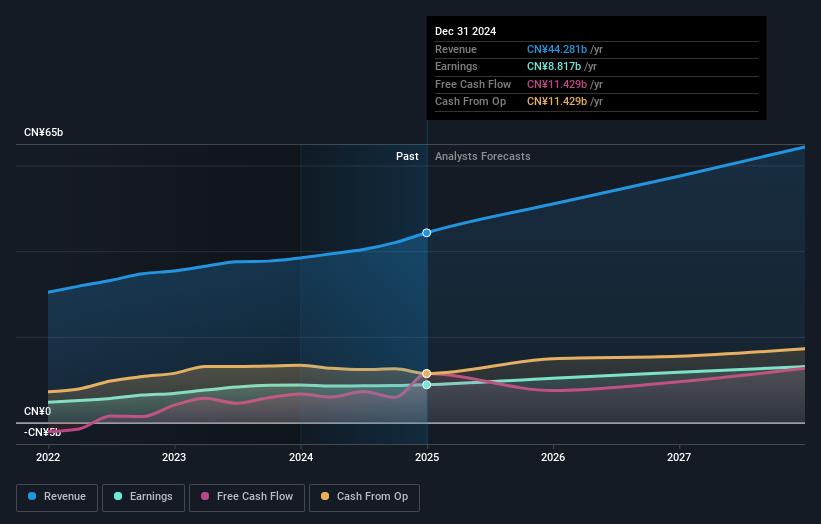
Key Insights
- Insiders appear to have a vested interest in ZTO Express (Cayman)'s growth, as seen by their sizeable ownership
- 51% of the business is held by the top 5 shareholders
- Institutions own 29% of ZTO Express (Cayman)
Every investor in ZTO Express (Cayman) Inc. (NYSE:ZTO) should be aware of the most powerful shareholder groups. And the group that holds the biggest piece of the pie are individual insiders with 40% ownership. Put another way, the group faces the maximum upside potential (or downside risk).
And following last week's 9.2% decline in share price, insiders suffered the most losses.
In the chart below, we zoom in on the different ownership groups of ZTO Express (Cayman).
See our latest analysis for ZTO Express (Cayman)

What Does The Institutional Ownership Tell Us About ZTO Express (Cayman)?
Institutions typically measure themselves against a benchmark when reporting to their own investors, so they often become more enthusiastic about a stock once it's included in a major index. We would expect most companies to have some institutions on the register, especially if they are growing.
ZTO Express (Cayman) already has institutions on the share registry. Indeed, they own a respectable stake in the company. This implies the analysts working for those institutions have looked at the stock and they like it. But just like anyone else, they could be wrong. It is not uncommon to see a big share price drop if two large institutional investors try to sell out of a stock at the same time. So it is worth checking the past earnings trajectory of ZTO Express (Cayman), (below). Of course, keep in mind that there are other factors to consider, too.

We note that hedge funds don't have a meaningful investment in ZTO Express (Cayman). The company's CEO Meisong Lai is the largest shareholder with 27% of shares outstanding. For context, the second largest shareholder holds about 8.4% of the shares outstanding, followed by an ownership of 8.0% by the third-largest shareholder.
Our research also brought to light the fact that roughly 51% of the company is controlled by the top 5 shareholders suggesting that these owners wield significant influence on the business.
While it makes sense to study institutional ownership data for a company, it also makes sense to study analyst sentiments to know which way the wind is blowing. Quite a few analysts cover the stock, so you could look into forecast growth quite easily.
Insider Ownership Of ZTO Express (Cayman)
The definition of company insiders can be subjective and does vary between jurisdictions. Our data reflects individual insiders, capturing board members at the very least. Management ultimately answers to the board. However, it is not uncommon for managers to be executive board members, especially if they are a founder or the CEO.
I generally consider insider ownership to be a good thing. However, on some occasions it makes it more difficult for other shareholders to hold the board accountable for decisions.
Our most recent data indicates that insiders own a reasonable proportion of ZTO Express (Cayman) Inc.. It is very interesting to see that insiders have a meaningful US$5.8b stake in this US$15b business. It is good to see this level of investment. You can check here to see if those insiders have been buying recently.
General Public Ownership
With a 22% ownership, the general public, mostly comprising of individual investors, have some degree of sway over ZTO Express (Cayman). This size of ownership, while considerable, may not be enough to change company policy if the decision is not in sync with other large shareholders.
Public Company Ownership
Public companies currently own 8.4% of ZTO Express (Cayman) stock. It's hard to say for sure but this suggests they have entwined business interests. This might be a strategic stake, so it's worth watching this space for changes in ownership.
Next Steps:
It's always worth thinking about the different groups who own shares in a company. But to understand ZTO Express (Cayman) better, we need to consider many other factors.
I like to dive deeper into how a company has performed in the past. You can find historic revenue and earnings in this detailed graph .
If you would prefer discover what analysts are predicting in terms of future growth, do not miss this free report on analyst forecasts .
NB: Figures in this article are calculated using data from the last twelve months, which refer to the 12-month period ending on the last date of the month the financial statement is dated. This may not be consistent with full year annual report figures.
Have feedback on this article? Concerned about the content? Get in touch with us directly. Alternatively, email editorial-team (at) simplywallst.com.
This article by Simply Wall St is general in nature. We provide commentary based on historical data and analyst forecasts only using an unbiased methodology and our articles are not intended to be financial advice. It does not constitute a recommendation to buy or sell any stock, and does not take account of your objectives, or your financial situation. We aim to bring you long-term focused analysis driven by fundamental data. Note that our analysis may not factor in the latest price-sensitive company announcements or qualitative material. Simply Wall St has no position in any stocks mentioned.